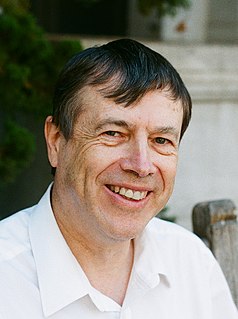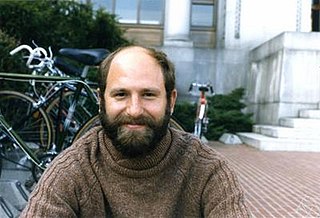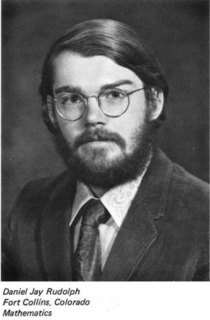Roger L. Jones is an American mathematician specializing in harmonic analysis and ergodic theory. [1]
Roger L. Jones is an American mathematician specializing in harmonic analysis and ergodic theory. [1]
He obtained a B.S. in mathematics in 1971 from University at Albany, SUNY, [2] and a Ph.D. in mathematics in 1974 from Rutgers University, with thesis Inequalities for the Ergodic Maximal Function written under the direction of Richard Floyd Gundy. [3] He has recently retired from a professorship in mathematics at DePaul University in Chicago. There he taught everything from remedial math to graduate-level courses. During his tenure at DePaul, Roger published numerous research papers in math, was awarded an excellence in teaching award, chaired the DePaul University Mathematics Department, and was awarded National Science Foundation grants related to teaching mathematics. He has also worked with the Chicago Public Schools on improving math instruction.
Roger was honored for his research work at the International Conference on Harmonic Analysis and Ergodic theory that was held in the name of Roger and his colleague Marshall Ash.
Roger has since retired from teaching at DePaul and moved to Northern Wisconsin, where he teaches mathematics at Conserve School.
Ergodic theory is a branch of mathematics that studies statistical properties of deterministic dynamical systems; it is the study of ergodicity. In this context, statistical properties means properties which are expressed through the behavior of time averages of various functions along trajectories of dynamical systems. The notion of deterministic dynamical systems assumes that the equations determining the dynamics do not contain any random perturbations, noise, etc. Thus, the statistics with which we are concerned are properties of the dynamics.

Elias Menachem Stein was an American mathematician who was a leading figure in the field of harmonic analysis. He was the Albert Baldwin Dod Professor of Mathematics, Emeritus, at Princeton University, where he was a faculty member from 1963 until his death in 2018.

Alberto Pedro Calderón was an Argentinian mathematician. His name is associated with the University of Buenos Aires, but first and foremost with the University of Chicago, where Calderón and his mentor, the analyst Antoni Zygmund, developed the theory of singular integral operators. This created the "Chicago School of (hard) Analysis".

Jean, Baron Bourgain was a Belgian mathematician. He was awarded the Fields Medal in 1994 in recognition of his work on several core topics of mathematical analysis such as the geometry of Banach spaces, harmonic analysis, ergodic theory and nonlinear partial differential equations from mathematical physics.

Alexandra Bellow is a Romanian-American mathematician, who has made contributions to the fields of ergodic theory, probability and analysis.
In mathematics, arithmetic combinatorics is a field in the intersection of number theory, combinatorics, ergodic theory and harmonic analysis.

Gustav Arnold Hedlund, an American mathematician, was one of the founders of symbolic and topological dynamics.

Mahendra G. Nadkarni is a professor emeritus, University of Mumbai. Nadkarni obtained his Ph.D. in mathematics from Brown University, the USA in 1964 for his work on Ergodic theory. His research interests include Ergodic Theory, Harmonic Analysis, and Probability Theory.

George David Birkhoff was an American mathematician best known for what is now called the ergodic theorem. Birkhoff was one of the most important leaders in American mathematics in his generation, and during his time he was considered by many to be the preeminent American mathematician.

Klaus D. Schmidt is an Austrian mathematician and retired professor at the Faculty of Mathematics, University of Vienna.
Bryna Rebekah Kra is an American mathematician and Sarah Rebecca Roland Professor at Northwestern University who is on the board of trustees of the American Mathematical Society and was elected the president of American Mathematical Society in 2021. As a member of American Academy of Arts and Sciences and National Academy of Sciences, Kra has made significant contributions to the structure theory of characteristic factors for multiple ergodic averages. Her academic work centered on dynamical systems and ergodic theory, and uses dynamical methods to address problems in number theory and combinatorics.
William A. Veech was the Edgar O. Lovett Professor of Mathematics at Rice University until his death. His research concerned dynamical systems; he is particularly known for his work on interval exchange transformations, and is the namesake of the Veech surface. He died unexpectedly on August 30, 2016 in Houston, Texas.

Robert Luke Devaney is an American mathematician, the Feld Family Professor of Teaching Excellence at Boston University. His research involves dynamical systems and fractals.

Manfred Leopold Einsiedler is an Austrian mathematician.

Wolfgang Krieger is a German mathematician, specializing in analysis.

Steven "Steve" Morris Zelditch is an American mathematician, specializing in global analysis, complex geometry, and mathematical physics.

Thomas Ward is a British mathematician, currently Pro-Vice-Chancellor (Education) at Newcastle University, who works in ergodic theory and dynamical systems and its relations to number theory.

François Ledrappier is a French mathematician.
Shahar Mozes is an Israeli mathematician.

Daniel Jay Rudolph (1949–2010) was a mathematician who was considered a leader in ergodic theory and dynamical systems. He studied at Caltech and Stanford and taught postgraduate mathematics at Stanford University, the University of Maryland and Colorado State University, being appointed to the Albert C. Yates Endowed Chair in Mathematics at Colorado State in 2005. He jointly developed a theory of restricted orbit equivalence which unified several other theories. He founded and directed an intense preparation course for graduate math studies and began a Math circle for middle-school children. Early in life he was a modern dancer. He died in 2010 from amyotrophic lateral sclerosis, a degenerative motor neuron disease.